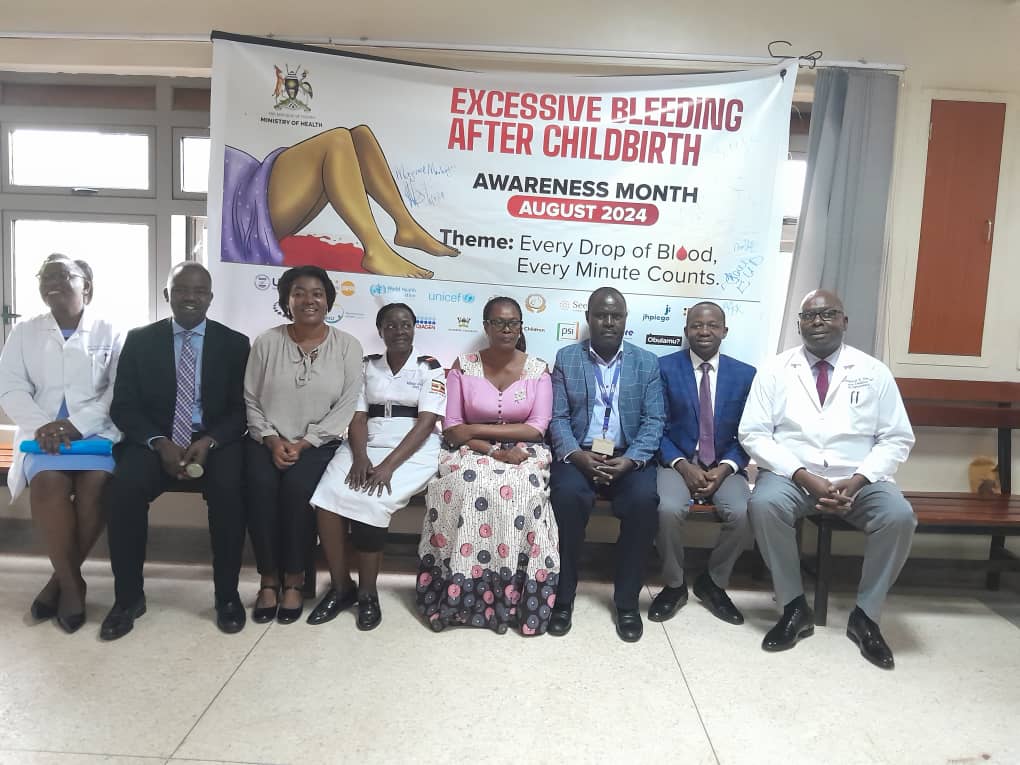
KAMPALA – The United Nations Population Fund – UNFPA in partnership with the Ministry of Health on Wednesday, July 31, launched SafeBirth Africa (SBA) – a new project that aims to strengthen health systems in Uganda and accelerate access to life-saving medicines in a significant drive to end preventable maternal deaths.
Through the three-year European Union-funded project, the Ministry of Health with support from UNFPA will work with health authorities, partners and communities to overcome barriers that limit access to life-saving solutions and new medicines that prevent women from dying from Postpartum hemorrhage – PPH.
Juliana Lunguzi, Sexual Reproductive Health and Rights Programme Coordinator at UNFPA noted that they are mandated on three transformative results and agenda; zero maternal deaths, easy access to family planning services, and no gender-based violence.
She noted that 4% of mothers who die during childbirth is a result of excessive bleeding – something that they have to shake heads and find everlasting solutions.
“We want to document the best way of reducing this issue, we need evidence so that we can plan better, we want to make sure we have the necessary materials and medication, we want to train the midwives, and doctors to these new protocols on how they can manage the cases.
She says they chose Kawempe National Referral Hospital to be one of their sites because it is one of the facilities that have many deaths which translates to so many complications including PPH.
“It was just timely that we doing this at Kawempe Hospital and we are starting an awareness campaign on the same.”
Uganda and Madagascar only countries chosen for this drive. Ms. Lunguzi attributed it to the country’s transparency to respond better when given resources because “we want evidence which we can share with other regions and scale up the initiative.”
Dr. Byaruganga Emmanuel – Executive Director, Kawempe National Referral Hospital noted that the facility is like a hub of the whole as far as maternal and child health is concerned.
“The hospital has a 200-bed capacity and at any one time, we have at least 300 patients. On average we have 150 mothers and 150 babies. Our labour is 40-bed capacity and at any one time, you find someone delivering. This hospital is the busiest in the country as far as maternal and child health is concerned.”
He said that they have an average of six deliveries a day which also translates to many babies and mothers with complications but the capacity to handle them remains low.
“We got a mother who badly needed an Intensive Care Unit due to PPH but she couldn’t get because you can’t remove a very sick person and you put another. So she is forced to go to the High Dependency Unit – HDU. So the chances of losing this mother increase,” he said, noting that, “every day, we have babies who need neonatal Intensive Care Unit but the place is 28-bed capacity.”
 Dr. Byaruganga called on partners and the government to provide them with equipment to ease their work of saving lives.
Dr. Byaruganga called on partners and the government to provide them with equipment to ease their work of saving lives.
“For example, our adult Intensive Care Unit has seven beds, only four are functional and right now all the four are occupied.”
The Chief Guest, Muhanga Margaret, State Minister for Primary Healthcare challenged the advocacy for safe motherhood with high cases of teenage mothers.
“We have to go back to our society, we partner with schools and educate our children especially those below 16, they barely understand what is happening. Sometimes they are impregnated by their relatives.”
“I want to call upon the mothers, speak to your children, tell them this is what happens when your body grows.”
Minister noted that Uganda has gone beyond population growth to now population explosion with half of its people below the age of 17.
“We don’t need quantity but quality numbers.”
For PPH, the minister partly attributed it to some mothers who don’t attend antenatal where they would have been explained what to do but rather come to the facilities when it is too late.
“We also need to fight some religious beliefs who tell people that family planning is not good. Some religions these days tell people not to go for family planning because they want numbers in their churches. There is one in Kagadi where they tell men to marry as many wives as possible and produce many children, meaning they want numbers for their cult.”
She pledged to take on the concerns of the hospital, especially the ICU challenge.





